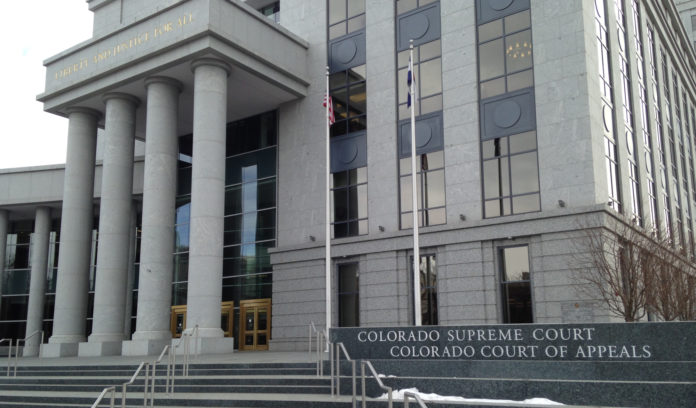
Editor’s Note: Law Week Colorado edits court opinion summaries for style and, when necessary, length.
Karyn Gregory v. Safeco Insurance Company of America and Runkel v. Owners Insurance Company
In these combined cases, the Colorado Supreme Court considered whether the notice-prejudice rule, which allows an insurer to deny coverage based on a claim’s untimeliness only if the insurer can show prejudice from the late notice, applies to occurrence policies in the context of first-party homeowners’ property insurance claims. Specifically, the court needed to decide whether the policy considerations underlying its adoption of the notice-prejudice rule in the context of uninsured/underinsured motorist policies and third-party liability policies extend to occurrence-based, first-party homeowners’ property insurance policies.
In the first case, Karyn Gregory had a homeowners’ insurance policy with Safeco Insurance Company of America. She didn’t notice a hail storm damaged the roof of her home until roughly 18 months after the storm when a contractor inspected her home in connection with her preparing to sell it. Safeco denied Gregory’s claim as untimely, and Gregory filed suit in the Denver District Court, asserting claims for a declaratory judgment, breach of contract, bad faith breach of the insurance contract and the unreasonable delay and denial of payment of her claim. The District Court granted Safeco’s motion for summary judgment and a division of the Colorado Court of Appeals affirmed the decision.
In the second case, Lisa Runkel and Sylvan Runkel III held a homeowners’ policy with Owners Insurance Company. A hailstorm also damaged the Runkels’ roof but they didn’t discover the damage until roughly one year later when a contractor informed them of it. The Runkels contended they filed the claim just 10 days after the expiration of the one-year notice period stated in the policy. Owners denied the Runkels’ claim as untimely, and the Runkels filed a declaratory judgment action in the Boulder County District Court, asking the court to conclude Colorado’s notice-prejudice rule applied to the one-year notice provision in their policy, Owners suffered no prejudice as a result of the delayed notice and they were therefore entitled to coverage for their hail loss. Owners moved for summary judgment, and the district court granted that motion. In a unanimous, unpublished opinion, a division of the Court of Appeals affirmed.
The state Supreme Court concluded the notice-prejudice rule applies to occurrence-based, first-party homeowners’ property insurance policies for two reasons. First, recent cases have consistently applied the notice-prejudice rule to occurrence policies like those at issue, in which the purpose of notice is to allow an insurer to investigate and defend against the claim and is not a fundamental term defining the temporal boundaries of coverage (unlike in a claims-made policy).
Second, the policy considerations the court identified in Clementi v. Nationwide Mutual Fire Insurance Company in 2001 for determining whether the notice-prejudice rule applies, namely, the adhesive nature of insurance contracts, the public policy objective of compensating tort victims and the inequity of granting the insurer a windfall due to a technicality, all support the application of the notice-prejudice rule here.
The Colorado Supreme Court reversed the decisions of the divisions and remanded both cases.
In this case, the Colorado Supreme Court considered the following certified question of law from the 10th Circuit Court of Appeals: “Whether [Colorado’s Sex Offender Lifetime Supervision Act (“SOLSA”), §§ 18-1.3-1001 to -1012, C.R.S. (2023),] requires, permits, or prohibits parole boards from considering maturity and rehabilitation.”
In this case, Omar Ricardo Godinez alongside three others kidnapped and sexually assaulted two women within a week of each other in 2011, according to the court opinion. Godinez was 15 years old at the time. Prior to sentencing, Godinez filed a motion challenging the constitutionality of his potential sentence under SOLSA. He argued SOLSA’s sentencing and parole scheme violates the Eighth Amendment as applied to him because it doesn’t consider his youthfulness, as required by the 2010 U.S. Supreme Court decision Graham v. Florida; SOLSA was written for adult not juvenile sex offenders; and SOLSA doesn’t provide the realistic opportunity for parole that Graham requires for juveniles convicted of non-homicide offenses and therefore results in what amounts to a life sentence for virtually all juvenile sex offenders. The trial court sentenced Godinez to consecutive and concurrent terms, comprising an aggregate, indeterminate sentence of 32 years to life in prison.
Godinez appealed, arguing his sentence failed to take into account the differences between adult and juvenile offenders; denied him any realistic or meaningful opportunity to obtain release based on demonstrated maturity and rehabilitation, as required by law; and amounted to a life sentence without the possibility of parole. A division of the Colorado Court of Appeals ultimately affirmed Godinez’s sentence, concluding the sentence was constitutional under the state Supreme Court’s precedent rejecting the view that a long-term aggregate sentence is the functional equivalent of a life without parole sentence.
The Colorado Supreme Court concluded SOLSA permits consideration of maturity and requires consideration of rehabilitation.

